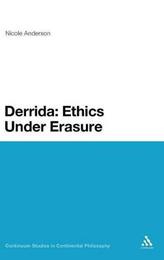
|
Derrida: Ethics Under Erasure
Hardback
Main Details
Description
Derrida's work is controversial, its interpretation hotly contested. Derrida: Ethics Under Erasure offers a new way of thinking about ethics from a Derridean perspective, linking the most abstract theoretical implications of his writing on deconstruction and on justice and responsibility to representations of the practice of ethical paradoxes in everyday life. The book presents the development of Derrida's thinking on ethics by demonstrating that the ethical was a focus of Derrida's work at every stage of his career. In connecting Derrida's earlier work on language with the ethics implicated in his later work on justice and responsibility, Nicole Anderson traverses literary, linguistic, philosophical and ethical interpretative movements, thus recontextualising Derrida's entire oeuvre for a contemporary readership. She explores the positive ethical implications of Derrida's work for representation and practice and asks the reader to consider how this new ethical reading of Derrida's work might be applied to concrete instances of his or her own ethical experience.
Author Biography
Nicole Anderson is Senior Lecturer in the Department of Media, Music, Communications and Cultural Studies at Macquarie University, Australia.
ReviewsToday, more than ever, it is necessary to step back from easy or pious uses of the word ethical. It has also been necessary, for some time now, to move beyond dismissals and deifications of Derrida. Nicole Anderson, one of the worlds most formidable Derrida scholars of the post-Derrida generation, achieves both these tasks. Derrida: Ethics Under Erasure provides a nuanced reading of Derrida, while accepting the difficulty of any simple affirmation of the deconstructive tradition. At once informed by tradition and original, Anderson's book sets the tone for a twenty-first century deconstruction. -- Claire Colebrook, Edwin Erle Sparks Professor of English, Penn State University, USA Nicole Anderson's Derrida: Ethics Under Erasure provides a wonderfully clear and convincing account of the ethical relevance of deconstruction. Ranging across Derrida's entire oeuvre, Anderson demonstrates that deconstruction calls us to rethink without ever abandoning such traditional ethical categories as freedom, responsibility, and moral obligation. It also shows how such an "ethics under erasure," far from being divorced from our everyday lives, can help explain our most concrete, lived experience. This book should put to rest once and for all the uninformed and yet widespread belief that deconstruction is irresponsible, unethical, or nihilistic. -- Michael Naas, Professor and Chair of Philosophy, De Paul University, USA Anderson's book clearly and patiently reveals the problems posed to contemporary philosophy by ethics, notably in the wake of deconstructive thought. Careful to avoid the simplifications which often accompany appeals to the "ethical" dimension of literary or philosophical discourse today, this study provides a necessary start-point for those wishing to evaluate seriously the question of philosophy as ethical practice. -- Simon Morgan Wortham, Professor of English, Kingston University, London, UK
|